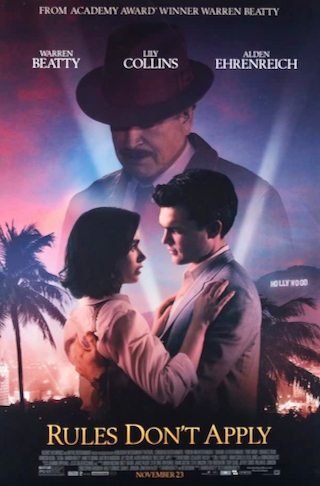Warren Beatty’s passion project “Rules Don’t Apply” became a financial flop in 2016 at the box office, but still-boiling lawsuits from investors reveals behind-the-scenes disputes over marketing.
Creative talent, financiers and studio executives battled over interpreting audience reactions in prerelease test screenings, selection of its holiday release date, creative messaging, who pays for advertising and the appropriate target audience.

The 20th Century Fox release, which came from producer Arnon Milchan’s Regency, premiered Nov. 23, 2016, but generated a miniscule $3.7 million in global box office. “Rules Don’t Apply,” which is a drama about legendary tycoon and aviation pioneer Howard Hughes, cost $31.1 million to make.
A Variety article by Gene Maddaus plumbs lawsuit filings revealing a complex financial structure with 100 financiers contributing, including a last tranche to boost advertising support (most studio films have one or just a few financers).
After two early test screenings in Pasadena, Calif. generated troubling reactions, a debate ignited internally whether to go for wide release or gradually expanding to capitalizing on hope-for professional critics’ reviews. Beatty prevailed for a wide release dated on the competitive Thanksgiving holiday weekend that independent films generally avoid because of stiff competition.
“According to Milchan, Beatty insisted on a wide release, ultimately prevailing on Regency and Fox to open the film on almost 2,400 screens,” says the Variety story by Maddaus. “The prints and advertising budget ballooned from $12 million-$14 million to more than $20 million.”
There was also disagreement if test screenings were poor indicators because of weight of minority demographics; the argument was that “Rules Don’t Apply” had strong appeal to the white racial demographic, which alone would power box office.
As for results from prerelease test screenings, Variety says that the recruited audience “complained that the film dragged in the middle, and most of those under 40 had no idea who Hughes was. According to a report from the testing company, viewers described Hughes’ eccentric behavior (on screen) as ‘frustrating,’ disturbing,’ ‘distracting,’ ‘repetitive,’ ‘annoying’ and ‘boring.’ “
Related content:
Leave a Reply